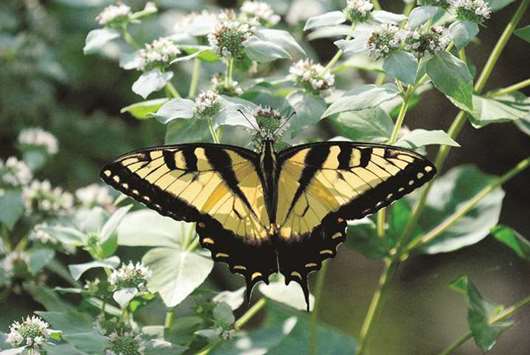By Norman Winter
A couple of weeks ago I was walking a trail and had one of those OMG moments as I spotted a plant 20 feet away and could tell it was a champion of pollinators. At the risk of being a plant geek, I will tell you it was amazing to watch the bees, swallowtails, and hairstreaks all on a frenzy to get to the flowers. When this happens you simply have to take notice as this is not an everyday occurrence in the garden.
The plant was a native called the hoary mountain mint. Botanically speaking it is known as Pycnanthemum incanum, pronounced pick-NAN-the-mum in-Kan-um. Your first thought may be that I am going to write about a ‘mint’ but I assure you these are champions. There are roughly 20 species found in the United States and Canada and the Herb Society of America named it Notable Native in 2016.
While others tout their aromas, oils, medicinal, or cooking uses I am simply talking about one of the best pollinator plants on the planet. Those with silver/whitish foliage like the Hoary Mountain Mint and the silver green Clustered Mountain Mint are also striking in the garden when grown either with other silver-leafed plants or against a backdrop of typical dark green leaves.
In Georgia, the Clustered Mountain Mints bloom from the end of May until frost while the Hoary Mountain Mint starts a little later. Further north they may not start blooming until June and July. While it might not capture your attention with its incredible colour it will simply mesmerise you with the sheer number of pollinators it attracts. You simply can’t walk away from the plant as you want to watch all that is happening and see what flying creature might come in next.
You may find yourself asking, ok, what about the flowers. The Clustered Mountain Mint is actually showy in the garden looking green then forming silver coloured bracts with disks that open to reveal small pink blossoms. The bracts are very striking and open the door for some wonderful plant combinations.
The Hoary Mount Mint Flowers has small white two-lipped flowers that may also exhibit lavender hues and purple spotting. They, too, are borne in terminal clusters. In the end, though you really find yourself wondering how those tiny pink flowers could be so delectable to the insect world.
The Mountain Mints seem to have found their niche in the plant mail order marketing programme versus the typical garden centre. No doubt there are those glorious garden centres that can testify that they sell them, and believe me we all stand and applaud.
The consensus is the name Mountain Mint is a little misleading, and that you’ll find them in open woods, thickets, and fields from the Gulf States to Maine. The best place to plant them in the landscape, to me, is in dry to medium, moist, but well-drained soil and grown at the woodland edge.
I have seen them performing in full sun but it seems a little afternoon shade is appreciated. You may be thrilled to know deer avoid these plants. In addition to the two I have been touting the North American Butterfly Association is also high on Narrow-leaf Mountain Mint, Pycnathemum tenuifolium, and the Virginia Mountain Mint, P virginianum, that is endangered or threatened in some states.
The silvery sheen from the bracts opens the door for a lot of landscape companions. I can only dream about the result if they were grown with spotted bee-balm Monarda punctata, Joe Pye Weed, Eutrochium purpureum, Hummingbird Mints (Agastache species and hybrids) like Blue Fortune, and Common Boneset, Eupatorium perfoliatum. It would be a backyard pollinator heaven – TNS

BEST POLLINATOR: Hoary Mountain Mint is also considered one of the best pollinators in the world.

ENDANGERED: Narrow-leaf Mountain Mint is one of the endangered and threatened species in some states of US.

